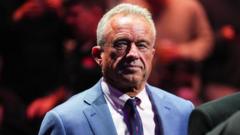
Robert F. Kennedy Jr., President-elect Trump’s nominee to lead the Department of Health and Human Services (DHHS), has set ambitious goals to transform American food and nutrition policies. Known for his controversial health claims, Kennedy aims to tackle what he sees as harmful ingredients in the food supply.
Kennedy’s platform, “Make America Healthy Again,” focuses on eliminating ultra-processed foods, which are linked to chronic diseases like cancer and diabetes. He has been particularly critical of school lunches, describing children as “swimming around in a toxic soup.” His proposed reforms include removing food dyes, additives, seed oils, and challenging existing FDA regulations.
Some public health experts support parts of Kennedy’s agenda. Marion Nestle, a nutrition professor, finds it “thrilling” that someone is addressing chronic disease, while Dr. Peter Lurie from the Center for Science in the Public Interest agrees that removing certain food dyes could be beneficial.
However, Kennedy’s proposals also face significant scientific and practical challenges. Experts dispute several of his claims, such as:
1. Raw milk: Researchers emphasize that unpasteurized milk can be dangerous and offers no significant nutritional benefits.
2. Fluoride: Removing fluoride from water would eliminate proven dental health benefits.
3. Seed oils: There’s no scientific evidence supporting his claim that these oils drive the obesity epidemic.
Kennedy’s potential leadership of the FDA, an agency with over 18,000 employees, raises additional concerns. He has pledged to “take a sledgehammer” to the agency, promising to fire employees he considers part of a “corrupt system.”
The food industry is likely to strongly resist Kennedy’s proposed reforms. Both the USDA and FDA regulate food industries, and changing established practices would require complex legislative and bureaucratic processes. Several food industry groups have already lobbied against his appointment.
Moreover, Kennedy’s position seems at odds with President-elect Trump’s previous approach to food regulations. During his first term, Trump rolled back health requirements for school lunches.
Despite the challenges, some experts suggest Kennedy could still make incremental changes. Marion Nestle recommends modifying the US Dietary Guidelines, which significantly influence food industry standards and federal nutrition programs.
Jeff Hutt, a spokesperson for the Make America Healthy Again political action committee, argues that even if complete food system transformation is impossible, the conversation itself is valuable.
Ultimately, Kennedy’s nomination remains controversial. While some appreciate his focus on food-related health issues, others are concerned about his history of spreading unsubstantiated health claims. His confirmation by the Senate will determine whether he can implement his proposed reforms.
The article suggests that while Kennedy’s goals might be well-intentioned, the path to meaningful change in the US food system is complex and fraught with political and industrial obstacles.







